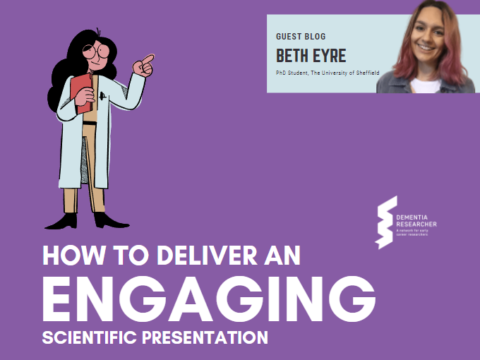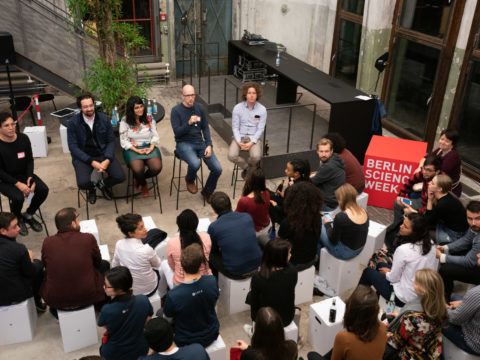I suspect speaking in public is a little like Marmite – either you thrive on it and find it a thrilling and stimulating experience, or it scares the living daylights out of you. Possibly both.
I first got into public speaking as a teenager who was somewhat socially awkward and gawky, but fond of performing and good at English. My English teacher Mrs Johnson gave me my leg up here and, I think, made all the difference to my life as a consequence. I will be forever grateful to her for showing me how a shy, bookish, slightly chubby bespectacled ‘smart kid’ can be transformed into a subject of approval just through presenting on stage. Though my sudden surge in popularity might also have been to do with the fact that I juggled with plates and nearly brained the headmaster…
The result of all of that is that I’m a bit of a diva, and, when asked, I usually love to give presentations. Despite the fact that I get nervous beforehand, I also get a genuine buzz from them.
But whether or not you’re a diva, there are some important things that you can do to help yourself give the best presentation you possibly can. I hope these little pieces of advice, from preparation through to reflection, help you.
Preparation
Write your paper as a piece to be presented. It isn’t a journal article! People can’t go back and reread a passage they don’t understand, or look at a dictionary to find a word. They have to be able to comprehend what you say rapidly, so make sure you’re clear and concise in your conceptual definitions, and that the flow of your argument is smooth.
Please write it to the length asked. Keeping a paper to time is a skill, one worth having and longer doesn’t necessarily mean better. If you can’t squish or stretch your idea to fit into the timeframe, rethink your idea. If in doubt, it is better to have a paper a little too short than a little too long.
Make sure that you write your paper far enough in advance to leave some time to practice. Not so much that you can recite it like a parrot, but enough so that you don’t need to refer to your notes too much.
Sometimes, it’s worth using props, visual and otherwise. You might use the venerable but berated Powerpoint or the apparently almost obligatory Prezi, if they’re appropriate for you. But perhaps it’s worth also thinking about using tactile, handleable things, sound or video or even smell.
But don’t use props just because you think it’s expected. I have seen phenomenal presentations where the presenter just relied on their own charisma and the quality of their work: no props at all. If that approach works for you and for the paper you are presenting, go for it. And never, ever, do things for the gimmick, or just for decoration or because they are fashionable. Make your props, or their lack, meaningful and active.
If you have particularly tricky visual media to present, or you aren’t sure if you’re operating system is going to play with that of the event, then check with the organiser or your chair/contact beforehand. Trust me, this saves a whole lot of stress at the beginning of the presentation and makes the waiting audience much more well disposed towards you.
During the Presentation and Just Before
- Don’t panic. I’ve always been told that sucking a boiled sweetie helps calm nerves. You’re prepared, you can do no more, and everyone there wants you to succeed – they want to have a good time as much as you do!
- Introduce yourself to your chair or the conference organiser in person when you arrive, and ask if you should upload your Powerpoint, if you have one, or if there is anything you should do to prepare.
- Don’t use paper. It rustles, you drop it, and it’s annoying. I use my Kindle these days, but I used to use flashcards with minimal notes. Try to minimise both risk and distractions for yourself and the audience.
- Speak up, and not too quickly. Speak appropriately for the size of the room, and make sure that microphones, if needed, are on.
Don’t hide behind lecterns or tables: I’m short, I get swamped by them, and I know how tempting it is to stand behind what is effectively a huge physical and emotional shield. But the audience needs to see you, and see you engage with your work. - Don’t fidget too much. You can be physically dynamic as appropriate for your presentation, but don’t wave your arms unnecessarily or tap your feet, etc. It’s distracting.
- Be aware of your timeslot in the day, and perform appropriately, turning it up or down as needed. I have observed the following: In the morning, people are tired, but after coffee/tea, they’re usually fine. Just before lunch, they get fidgety and grumpy. After lunch, people are likely to be perky, but around 1500, they get sleepy and hungry again. Gauge your audience and their mood, and work with it rather than against it.
- Wear something that makes you feel good. You want to feel smart and professional and intelligent. It sounds shallow, but clothing does make a difference not only to how you are perceived, but how you perceive yourself.
The Questions
This is often one of the things people are most worried about. The dreaded questions at the end where the façade of intellectual professionalism you have created crumbles into nothingness. There are several things to remember:
People aren’t usually out to get you. If they’re asking a question, they’re probably genuinely interested. If you do think they’re being deliberately cruel, respond politely and try to speak to them or an organiser afterwards.
It’s good to be prepared for possible questions beforehand, so do try to think what people might ask. Preparation really will help. But don’t be surprised if you get some curveballs!
Also, don’t be surprised if you don’t get asked any questions. I know I always fall into the trap of feeling as though I’ve done a boring presentation if people don’t respond immediately. But that isn’t necessarily the case – and remember, they may come up and ask you more afterwards.
Reflection
It is always worth reflecting on what you’ve done. How did the presentation go, how did the audience react? What could you have done better? Did you use sensory props as well as you could have? What differences would you make in terms of content and the construction of the paper if you had to do it again?
Perhaps keep a diary of the presentations you give, in which you can answer these questions and log your changes and hopefully improvements over time. It might give you an idea of your weaknesses, but also of your strengths and your evolution.
I think the most important thing, though, is to write a presentation that is reflective and performative of who you are. I’ve given you pieces of advice above, but you have to mould them to fit your own style. I’m not going to say that there are no hard and fast rules – I’m fairly sure, for instance, that you can’t sensibly give a presentation on Wittgenstein’s Tractus entirely in the form of interpretive dance (do prove me wrong if you can) – but I would say be innovative and interesting where possible. Don’t succumb to the Powerpoint if you don’t think it’s appropriate for your presentation, but don’t consign it to oblivion, and use it well if you choose to.
In presenting your work, you are presenting yourself. Treat your papers as a form of intellectual practice, and exemplify what you research within them: show, to the rest of the world, the unexpected wonders and dangers of the inside of your imagination.
Thanks to Dr. Jenny Walklate for writing this article
 About Jenny – I recently completed my PhD in Museum Studies at the University of Leicester. My research project used literary theory and strategies to investigate the production and experience of temporality in museum spaces, and its analytical model is one I hope to develop in the future. After completing my first degree, an MA.Hons. in Medieval History at the University of St. Andrews, I commenced a full Masters at the University of Leicester’s School of Museum Studies. There I won an AHRC scholarship to conduct my PhD research, and was fortunate to have a rich, varied and enjoyable time as a full time research student. Currently, I’m looking for academic jobs – many of my posts will focus on this aspect of post-PhD existence – but I am fortunate to be able to blog here, and to have a role as the Treasurer for the Subject Specialist Network, the Museum Ethnographers Group. I hope that I will be able to provide information and encouragement to those at all stages of their PhD, and afterwards for the life beyond.
About Jenny – I recently completed my PhD in Museum Studies at the University of Leicester. My research project used literary theory and strategies to investigate the production and experience of temporality in museum spaces, and its analytical model is one I hope to develop in the future. After completing my first degree, an MA.Hons. in Medieval History at the University of St. Andrews, I commenced a full Masters at the University of Leicester’s School of Museum Studies. There I won an AHRC scholarship to conduct my PhD research, and was fortunate to have a rich, varied and enjoyable time as a full time research student. Currently, I’m looking for academic jobs – many of my posts will focus on this aspect of post-PhD existence – but I am fortunate to be able to blog here, and to have a role as the Treasurer for the Subject Specialist Network, the Museum Ethnographers Group. I hope that I will be able to provide information and encouragement to those at all stages of their PhD, and afterwards for the life beyond.
The article was first published at jobs.ac.uk

 Print This Post
Print This Post





